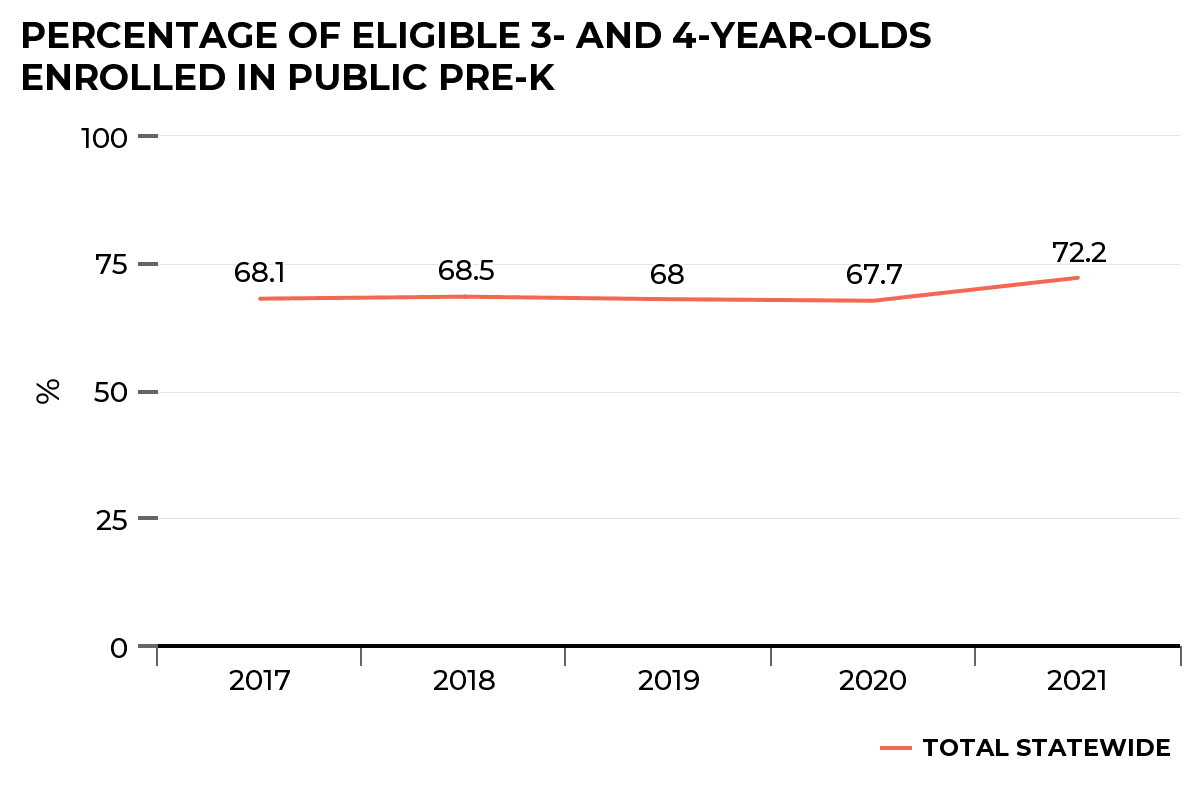Strategic Framework: Why pre-K matters in TX
This is part of our blog series for Texas 2036’s Strategic Framework, which provides in-depth, cross-cutting data to inform key decisions about the most significant issues facing the state.
One of Texas 2036’s goals in its Strategic Framework is Early Literacy, Goal No. 1, chosen with the aim that Texas children get a strong early start to succeed in school and life. A leading indicator of that goal is public pre-kindergarten enrollment for eligible children.
The Texas Legislature determines eligibility requirements for free, public pre-K. The intent is to provide early learning experiences to assist students who are most at risk for not being school-ready by kindergarten.
To be eligible for enrollment in a free pre-K class, a child must be at least three years of age on or before Sept. 1 of the current school year — if a 3-year-old program is available — or four years of age on or before Sept. 1 of the current school year.
A child qualifies if they are in any of these groups:
- Unable to speak and comprehend the English language;
- Educationally disadvantaged;
- Homeless;
- Child of a member of the armed forces;
- Been in foster care; or,
- Child of a person eligible for the Star of Texas Award.
Over the last five years, the percentage of eligible children who enrolled in public pre-K ranged from 68.1% to 72.2%.

The demographic breakdown of the latest year available is presented below. Enrollment by race/ethnicity ranged from about 50% of eligible Pacific Islanders to over 77% of eligible Hispanics.

Regarding economic status, Kids Count Data Center uses U.S. Census Bureau data to estimate the share of children ages 3 to 4 not enrolled in school, including nursery school, preschool or kindergarten, during the previous three months by poverty status. These data points are for Texas across 2015-2019 and evidence that the majority, 63%, of Texas’ children in poverty were not reached by the educational system during the period of crucial growth.

Nationally, Texas ranked lower than the U.S. average, 57% to 61%, of 3- to 5-year-olds enrolled in school for 2019, per the National Center for Education Statistics. This ranks Texas as 35th in the school enrollment percentage for this age group.

The Texas Education Agency has an outreach program to enroll the approximately one-quarter million of eligible children — about 50,000 eligible 4-year-olds and 225,000 eligible 3-year-olds — that do not participate in the free, public pre-K offered.
The Pre-K Enrollment Toolkit “offers ideas to help guide school districts and charter schools with each step in the process of recruiting, enrolling and serving pre-kindergarten-eligible children and their families. The toolkit is composed of five categories: Outreach, Family Education, Registration, Expanding Access and Community Empowerment. Each category will have strategies with specific tools and content to help expand enrollment in High-Quality prekindergarten.”
Texas can do better to provide the best early educational start to its vulnerable children. Enrollment can be improved as can the quality of Texas’ pre-K. The National Institute for Early Education Research, or NIEER, developed a 10-point Quality Standards Checklist. The checklist represents a set of minimum criteria, established by state policy, needed to ensure the effectiveness of preschool education programs, especially when serving children who are at risk for school failure. NIEER states that “no state’s pre-kindergarten policies should be considered fully satisfactory unless all 10 benchmarks are met.”
During the 2020-2021 school year, Texas met only four of 10 NIEER quality standards benchmarks. This places Texas in the minority of 14 state-funded preschool programs meeting fewer than half of the quality standard benchmarks, including three of the four largest programs nationally.
Hopefully, efforts like the Pre-K Enrollment Toolkit and placing a priority on high-standards pre-K will lead Texas to attain improved coverage of quality early childhood education and provide a jumpstart to learning in elementary school and beyond.
